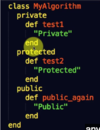Object Oriented Programming in Ruby Flashcards
(35 cards)
Define a Class: Dog,
let it have a Function: bark.
It can say anything you want.
class Dog
def bark
“woof”
end
end
Given a class named Dog, create a child class that inherrits the bark method.
bonus, can you override the bark method?
Class ChildDog < Dog
end
Class ChildDog < Dog
def bark
“miauw”
end
end

Make a class named MathFunctions. Then outside the class, define a classmethod for Mathfunctions called Tripple. It should take variable and tripple's it.
Class MathFunctions
en
def MathFunctions.tripple(var)
var *3
end

Write an initializer for Person(name),
Write the getter and setter Method,
don’t use any of the attr_<***>.
Class Person
def initialize(name)
@name = name
end
def name
@name
end
def name=(new_name)
@name = new_name
end

How would you build a contructor for a Person Class
He/She needs a name and age!
def initialize(name, age)
@name = name
@age = age
end

Make a onliner for attribute setter
and getter for the variable: name
attr_accessor :name
For the initialize constructor:
Let age be a Class Method.
given initialize only takes name and age.
check if age is not over 120.
def initialize(name, ageVar)
@name = name
self.age = ageVar
end
def age=(new_age)
@age = new_age unlesss new_age > 120
end

There basicly 3 ways to add a Class Method,
witch ones?
Where should they be declared?
inside the class:
class << self
def method_in_class_in_class
end
end
def self.method_in_class
end
outside the class:
def TheClass.theMethod(variables)
end

Define a class variable named: counter
@@counter
How would a method look like
inside the scope of a constructor?
example:
def initialize(age)
self.age = age
end
def age=(new_age)
@age ||= 5
@age = new_age unless new_age > 120
end

Scope: Constants
How is a Constant defined,
whats the diffrent with normal variables?
MyConstant = “This string is a constant”
- Inner scope can see Constants defined on the outside, and even change them.
- The value of the outher scope doesn’t change with changing the Constant on the inner scope.
# define v1 = "outside" outside of a class define v1="inside" inside of a class MyClass,
inside of a class my_method.
v1 = “outside”
class MyClass
def my_method
v1 = “inside”
end
end

Define a module named: Test,
in with a constant pi lives.
it should hold the value of pi (3.14 )
The module should have a inner class,
and a method putting out pi.
How would you call it ?
How would you include it?
module Test
PI = 3.14
class Test2
def what_is_pi
puts PI
end
end
end
Test::Test2.new.what_is_pie # => 3.14

Would a constant defined inside module,
be readeble for a class outside that module? or a class inside in that module?
it would if the module would be included, like
require_relative ‘module’ .
Yes, classes can handle Constants in Modules defined on the outher scope.

Implement a module namend “foobar”.
include ‘foobar’
What are the reasons for using a module?
Modules are best in use for grouping
Methods and Functions for two main reasons:
A: name spacing
B: mixins

What does Mixin mean?
Sharing functionality, functions, methods and code
with other modules, classes, and objects.
Like ‘enumerable’

What is namespacing?
a way to let objects with the same name
live through seperating them.

Can you implement Enumerable inside the
Class Team ?
class Team
include Enumerable # good functionality
… …. …
def each # => needed to initiate Enumerability
@player.each { | player | yield player }
end

# Define a module Sports that has a class of Match. and a method that holds @number
getter and setter.
make a new1 match object.
give it a score of 35
module Sports
class Match
def match_count
attr_accessor :number
end
end
end
new1 = Sports::Match.new
new1.score = 35 ; #=> puts new1.score == 35

You have a player.rb file.
Inside it, include game.rb, and match.rb
class Player
require_relative ‘game’
require_relative ‘match’
end

You have a module Math with a class Calculator. Create a new instance my\_math from it.
module Math
class Calculator
attr_accessor :results
end
end
my_math = Math::Pi.new
my_math.results = “new result”

Scope : block
Describe what a block is, and what it’s scope is.
A block is a closure.
Block inherrits from the outher scope, unlike a method.
Blocks remember the context in witch they where created, and uses that context whenever it is called.

Enumerable,
name 4 methods from the Enumberable.
Can it be used on other classes?
each select reject map
yes,

def each
@enumberable.each { | enumberable | yield |enumberable
end












